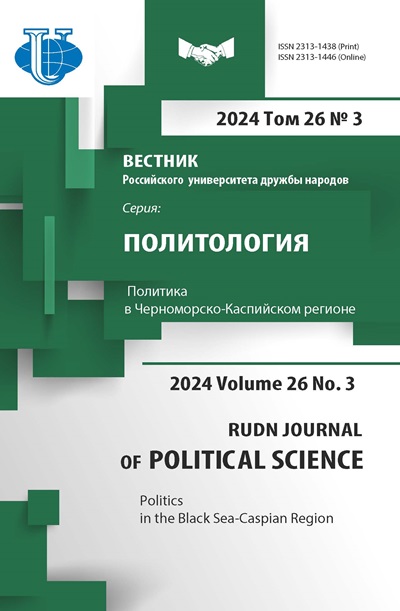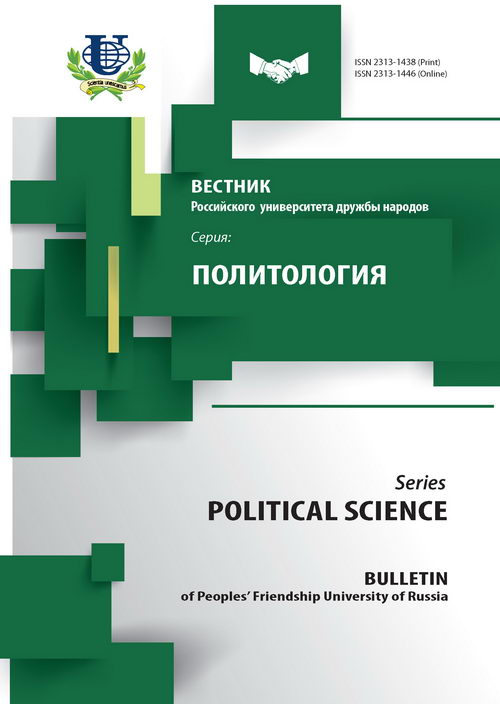No 1 (2013)
- Year: 2013
- Articles: 16
- URL: https://journals.rudn.ru/political-science/issue/view/561
ARTICLES and REVIEWS
Public-Private Partnership as Political Phenomenon: Perspectives of Adaptation of Successful Foreign Practices to the Russian Reality
Abstract
Public-private partnership show great development in modern Russia. Since the technology of interaction between business and government came from abroad it requires detailed consideration of the successes and current practices in the modern world. It is particularly important to identify relationships between form of government and decision making, both for political and economic decisions, as in most cases, these factors have the strongest influence on the formation of public-private partnership as an institution of the modern political process in Russia.
RUDN Journal of Political Science. 2013;(1):5-14
 5-14
5-14


Estimation Problems of the Migratory Potential of the Population
Abstract
The state policy in the region of control of the migratory processes of population must be intelligible to the citizens of the country and is directed toward reaching of positive results in the social, economic and other vitally important spheres of state. A new approach to the estimation of the migratory potential of the country and its components is proposed; such as migratory activity, migratory expectation and demographic factor. Formal approach for calculating the criteria indicated will make it possible to objectively estimate the level of the migratory potential of the country.
RUDN Journal of Political Science. 2013;(1):15-21
 15-21
15-21


 22-27
22-27


Chinese Political Strategy in East Asia. Part I
Abstract
This article is devoted to the actual problem of transformation of foreign policy strategy of China in Eastern Asia during the last years. The main aspects of Chinese policy in the region are domination of economic approaches and practical embodiment of “soft power” concept. China seeks to transfer reviews about problematic points in economical interaction with the region`s countries and decisions about territorial disputes from the multilateral level to bilateral level, furthermore actively counteract to the policy of the USA and Japan, trying to make an “anti-sin coalition” from the perspective of institutional design within the political-military organization by the type of NATO.
RUDN Journal of Political Science. 2013;(1):28-42
 28-42
28-42


Urban “Guerilla” in Latin America: “Tupamaros” and “Montoneros”
Abstract
In the article there are analized the ideology and the military-political practice of the urban guerra de guerrillas in Latin America. This phenomenin appeared in the urbanized and industrial countries of the sub-continent — Brasil, Argentina, Uruguay. Typical representatives of urban guerra de guerrilas are the «Tupamaros» of Uruguay and the «Montoneros» of Argentina. The main ideologist of the movemant to this moment is brasilian Carlos Mariguella.
RUDN Journal of Political Science. 2013;(1):43-49
 43-49
43-49


Syrian Gambit: a Clash of Interests in the Geostrategic Complex «Greater Middle East»
Abstract
Syria was at the center of one of the geo-strategic complexes that have arisen as a result of the Cold War and the redistribution of global domination. Key characteristics of the political regime of Syria in the context of the contradictions between the global and regional political players in this important region of the world politics are closely monitored to many analysts, however, although these descriptions are valid to some extent, the Syrian regime is actually a mode of “nomenclature” that can not be reduced to any of the used stamps.
RUDN Journal of Political Science. 2013;(1):50-59
 50-59
50-59


The Role of Central Asia in the World Political System “The Great Game” in Central Asia in 21 st Century
Abstract
The article is dedicated to the modern status of Central Asia in world politics in the context of the struggle of “great powers” for the influence in this region. The author emphasizes that it is necessary to include Central-Asian states to the Eurasian integration processes to avoid their transformation to the periphery of the world political system.
RUDN Journal of Political Science. 2013;(1):60-67
 60-67
60-67


 68-83
68-83


Conceptual Foundations Of Deliberative Democracy
Abstract
The article is dedicated to the analysis of theoretical foundations of deliberative model of democracy that is formed on the basis of synthesis of traditionally opposing approaches to research of democracy — liberal political philosophy (J. Rawls) and critical social theory (J. Habermas). Special attention is paid to the problems of testing of normative requirements to the public discourse as the basis of deliberative process.
RUDN Journal of Political Science. 2013;(1):84-94
 84-94
84-94


XXII World Congress of International Political Science Organization in Spain: “Reshaping Power, Shifting Boundaries”
Abstract
The article analyses the results of the work of XXII World Congress of International Political Science Association “Reshaping Power, Shifting Boundaries” in Spain, Madrid 8 to 12 July 2012. The author shows significance of the main theme of Congress. He describes the key problems and thesis, which were presented during the Madrid`s Congress: global reshape of power, shift boundaries, global identity, world crisis, “democratic deficit”, “governance”, democracy index. The author analyses the role of Russian political scientists in the work of the Congress.
RUDN Journal of Political Science. 2013;(1):95-110
 95-110
95-110


The Study of Empire: from the Definitions and Conceptual Models to Identification of Paradigm
Abstract
The article examines the origin and definition of the term “Empire”, analyses the conceptual model of the Empire established in the modern political science. The author justifies the category of “the paradigm of the Empire”, disclosed its value.
RUDN Journal of Political Science. 2013;(1):111-118
 111-118
111-118


 119-129
119-129


Human Potential As The Resource Of Modernization
Abstract
The article is dedicated to problematic of human potential realization as the key requirement of carrying out of modern projects. The case studies are also included in order to demonstrate the necessity of synchronizing of all aspects of human capital between each other, and the necessity of taking them into account while planning transformations.
RUDN Journal of Political Science. 2013;(1):130-136
 130-136
130-136


The Role of New Media in the Political Communication: Internet as an Instrument of Setting the New Agenda
Abstract
The author examines the Internet as a key element of the political communication system. He explored new trends and distinctive characteristics of this new form of ruling power: interactivity, hypertextuality, multimedia, packet communication, synchronization.
RUDN Journal of Political Science. 2013;(1):137-149
 137-149
137-149


Political Communications: New Opportunities and Technologies
Abstract
The article is devoted to the research of the issues of the political communications. The main opportunities and technologies of mass media and communications use are considered. Much attention is paid to the further development of Internet as the means of influence on public opinion.
RUDN Journal of Political Science. 2013;(1):150-155
 150-155
150-155


On Our Authors
RUDN Journal of Political Science. 2013;(1):156-157
 156-157
156-157
















